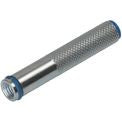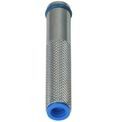
Internally threaded sleeve with building authority approval
Internally threaded sleeve M 10 x 80 mm
Internally threaded sleeve has building authority approval. The internally threaded sleeve has an outer diameter of 14 mm.
Area of application: If climbing holds are attached to masonry, the following must be distinguished:
Is it a hollow block masonry/perforated brick or a solid brick. Before you buy, please test the masonry where the climbing wall is to be built with a small test hole.
Variant 1) Hollow block masonry/perforated brick
For fastening in hollow block masonry/perforated bricks, you need a perforated sleeve for the internally threaded sleeve. You also need a tube of injection adhesive, of course with building authority approval. A bottle of injection adhesive is sufficient for approx. 5-7 holes in this masonry, i.e. attachment points for climbing holds.
Precise assembly instructions are supplied with the injection adhesive.
Variant 2) solid brick
Solid bricks are bricks without air holes. In this case, you do not need a perforated sleeve, but only the internally threaded sleeve and the injection adhesive, of course with building authority approval. A bottle of injection adhesive is sufficient for approx. 10 to 12 holes in this masonry, i.e. attachment points for climbing holds.
Precise assembly instructions are supplied with the injection adhesive.
Eigenschaften und Montage
Eigenschaften:
- Werkstoff: Stahl verzinkt
- metrisches Innengewinde M10
- dickwandige Ausführung (Plattenstärke ca. 2 mm)
- Mutternhöhe (inkl. Platte): ca. 12,0 mm
- erforderlicher Vorbohrdurchmesser: ca. 12 mm
- Befestigung der Spezial-Einschlagmutter mit 2 Spanplattenschrauben
(ca. 4 mm Durchmesser) - Befestigung der Klettergriffe mit einer gewöhnlichen M10 Schraube
Option mit Spanplattenschrauben,
Eigenschaften der Spanplattenschrauben:
- Vollgewindeschraube mit formschönen Pan Head Kopf zur universellen
Befestigung von Metallbeschlägen oder Halterungen aus Kunststoff in Holz
im trockenen Innen- oder Feuchtbereich - Ideale Kraftübertragung dank RW-Antrieb
- Mehr Power durch größere Kontaktfläche am Bit
- Mehr Stabilität, einhändiges Arbeiten, punktgenaues Ansetzen durch
Steck-Effekt und perfekten Sitz des Bits - ASSY 4 PH Stahl verzinkt Vollgewinde Pan Head RW
- SHR-PANHD-HO-RW20-(A3K)-5X20/18, ASSY
4 PH
Fazit:
Die Spezial-Einschlagmutter "PROFESSIONAL" bietet Ihnen eine
hochwertige Alternative zur normalen Einschlagmutter. Auch weist sie Vorteile
gegenüber anderen Spezial-Einschlagmuttern, die mit 4 Spanplattenschrauben
montiert werden, auf. Der Grund hierfür ist nicht nur der halbierte
Arbeitsaufwand bei der Befestigung der Spezial-Einschlagmutter
"PROFESSIONAL", sondern auch ihre Belastbarkeit. Denn die zwei Löcher
für die Spanplattenschrauben haben einen wesentlich größeren Durchmesser als
die vier Löcher in einer herkömmlichen Spezial-Einschlagmutter. Dadurch können
bei der Montage der "PROFESSIONAL" dickere Schrauben verwendet
werden, wodurch Ihre Klettergriffe den optimalen Halt bekommen.
Montage
Als ersten Schritt legen Sie ein Raster an und markieren alle Stellen, wo später die Einschlagmuttern gesetzt werden sollen. Für Boulderwände empfiehlt sich ein Lochraster von 10 cm (Bedarf pro qm: 95 Einschlagmuttern oder 15 cm (Bedarf pro qm: 45 Einschlagmuttern), wobei jeweils die zweite Reihe versetzt zur oberen Reihe ist. Eine andere Variante ist, dass Sie genau so viele Einschlagmuttern verwenden, wie Sie Klettergriffe haben. Der Nachteil an dieser Variante ist, dass Sie wenig Umschraubmöglichkeiten an der Wand haben. Zudem müssten bei einer Erweiterung der Kletterwand für mehr Einschlagmuttern, die ganzen Platten wieder abmontiert werden.Nachdem markieren der Stellen für die Einschlagmutter, bohren Sie dort 12 mm Löcher. In diese wird die Einschlagmutter von der Rückseite in die Platte eingeschlagen. Für einen besseren Halt der Einschlagmutter, tragen Sie bitte einen speziellen Holz-Metall-Kleber auf die Mutter auf.

